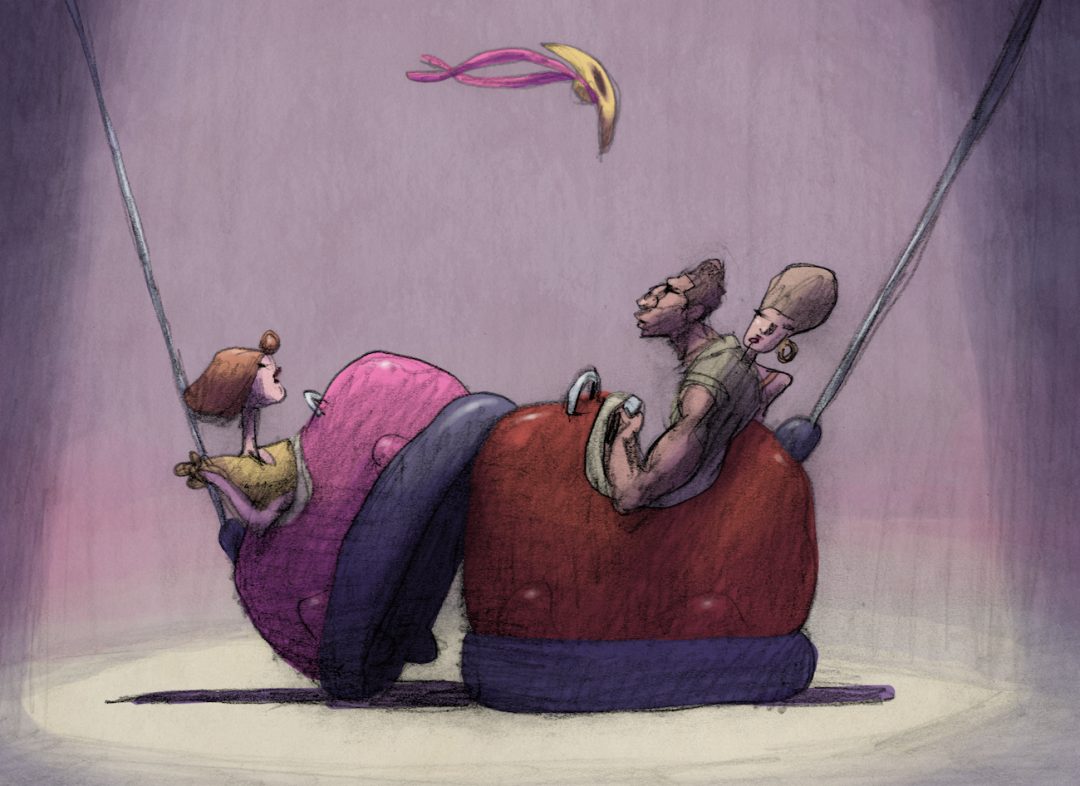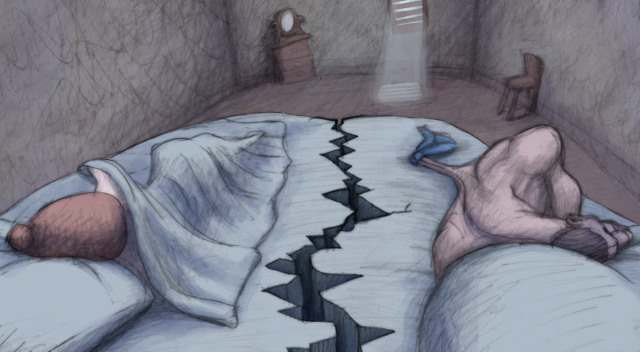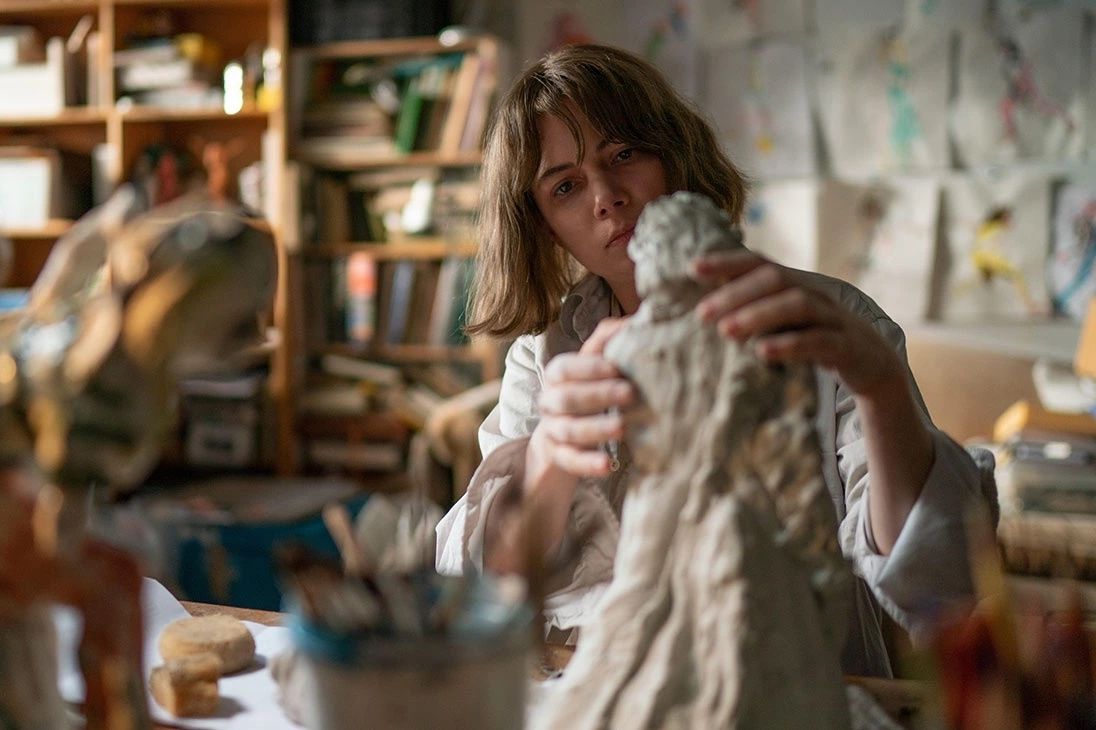Portland Animator Bill Plympton’s Cheatin’ Heart

When it comes to animation movies, there’s Disney, Pixar, Dreamworks and Laika. And then there’s Bill Plympton. The Portland filmmaker has been making his own independent films for decades now—often directly funded by fans and without any big studio help— and they’re finding an audience. His latest feature, Cheatin’, is the story of a woman who falls madly in love with a man she meets at a carnival. They consummate and cohabitate, but things take a dark turn when a jealous woman fabricates “evidence” that the woman has been unfaithful.
So how did Plympton—who made his name on comedic, gore-splattered animated shorts like the Oscar-nominated Guard Dog, in which a character is decapitated and later sneezes himself inside out—end up with a romantic drama on his hands?
“I had a relationship about 20 years ago, and I thought this was my soul mate and that we’d spend the rest of our lives together,” he says. “So we moved in to an apartment and after one month we wanted to strangle each other. Yet we still wanted to have sex. I thought that was really interesting, that a relationship had those two opposing passions within the same couple.”
The result, which clocks in at over 70 minutes, is a hand-drawn train wreck of a love affair, with a fittingly carnivalesque score by French composer Nicole Renaud.
In Cheatin’ Plympton’s old school, sketch-driven style—which has appeared in publications including Vanity Fair, the New York Times, and Penthouse over a career spanning more than forty years—is faithfully translated to the big screen. “It’s the first time my style as an illustrator has been available in animation,” he says. “The producer came up with a technique. . . and I fell in love with it.”
It’s clear from Cheatin’ that Plympton is having fun with these visuals, the characters at once human in their emotional arcs, and surreal in their visual depiction and in the flights of fancy taken with the script. But at no time do they actually speak.
“In 2005 I did a film called Hair High and my cousin Martha Plimpton got a lot of big name actors to appear in it,” he recalls, name checking the likes of Sarah Silverman and Dermot Molroney. “I had to pay a lot of money and I thought it would be my breakout film because of my star power.” Instead, the film bombed and Plympton resolved to avoid dialogue with his next film, which turned out to be a hit. “It’s a lot easier to sell to foreign countries, simply because there’s no dubbing or translating or subtitling, which is very expensive,” he points out, adding that he also doesn’t think he’s a good writer of dialogue. “And I think it’s more powerful storytelling to use just images and music.”
Financing independent films, he makes clear, is an issue though, and one which can weigh on creative considerations. Yet he manages these days to keep his head above water most of the time. “I’m not Pixar or Dreamworks, I don’t make millions of dollars, and my budgets are very tiny. The budget for Cheatin’ was about $400,000 and I can make it back on theatrical sales, DVD sales and internet sales, but I do not get rich.” That said, his lack of a studio means he can work independently and “make the kind of films that I want to make.”

Scene from Cheatin'
And when all else fails, there’s always Kickstarter. “Kickstarter is a Godsend,” says Plympton, who has funded a number of projects this way and even used it to finish Cheatin’when he ran out of money. “Before I would have to go out to Hollywood and do a pitch session and get rejected daily, and that was very frustrating and a negative experience. Now I go to my fans, who are really the appropriate people to fund my films.”
As someone who has been in the business for decades—and made of it a success, with two Oscar nominations under his belt and a slew of awards—what advice does he have for young animators starting out nowadays? “I have what I call Plympton’s dogma, and these are three rules to make films that will be successful—in other words you’ll make money.
“Rule number one is if you’re making a short film, make it short, five minutes or less. Don’t make it ten minutes – it’s impossible to sell. Number two, make your film cheap: try to spend at most $1,000 per minute because that’s easier to make back. And number three, make the film funny. If you make a funny film everybody will want to see it, everybody will want to buy it, everybody will want to show it.” He pauses. “If you follow those three rules, you’ll be a successful adult filmmaker.”
The adult part is no small consideration: Plympton is making it his mission to change perceptions about the audience for animation. “Animation is such a wonderful art form, so why are we forbidden to talk about adult subjects in animation? Why do kids get to be the only ones who can enjoy an animated film?” In Cheatin’, the themes and their treatment are undeniably adult. “I hope it will break that stranglehold that kids and computer animation have on the American public.”
He’s been on the road to attend its openings in cinemas across the country, and this Friday (April 24) finds him back on home turf, in Portland, where it opens at Cinema 21. “Portland has always been a very artistic and cultured city,” he says, adding that he had a “lot of support” as he began his own artistic career here in the late sixties.
His Portland arrival comes as part of a trip across the country where he’s been visiting cinemas to introduce the film to the big-screen audiences it finds. It’s a far cry from the kind of roll-out we’ve seen for Frozen, or for any big budget animation in recent years, but then Plympton is a different kind of animator. He’ll meet his hometown fans face-to-face on Friday where he will introduce the film at Cinema 21. Added bonus? There’s a free sketch by Plympton for every member of the audience. Disney, eat your heart out.
Cheatin’ opens at Cinema 21 on Friday, April 24 with an introduction from Bill Plympton. It came out on Vimeo on Demand this week, and is also available on iTunes.




